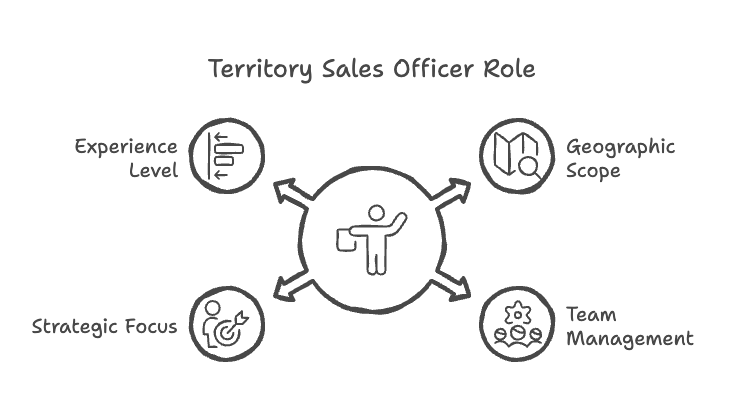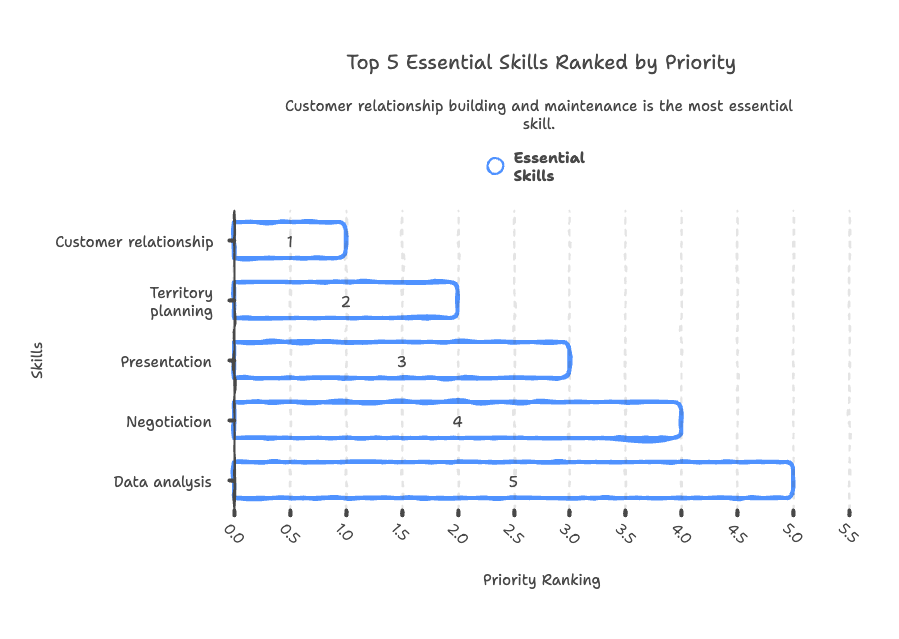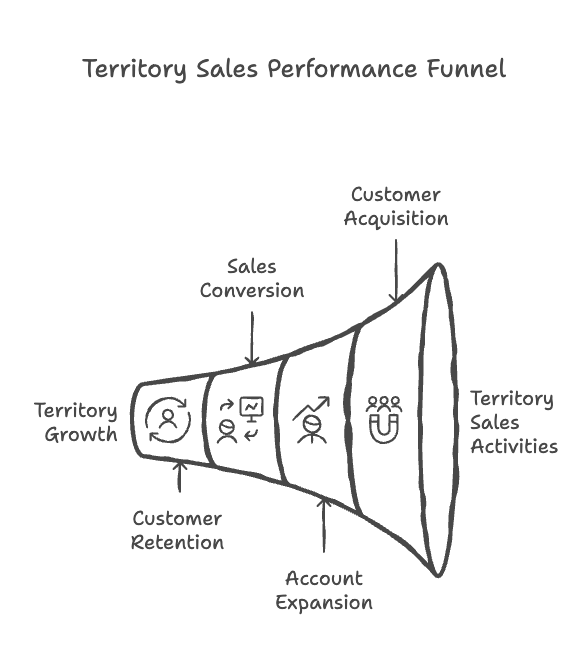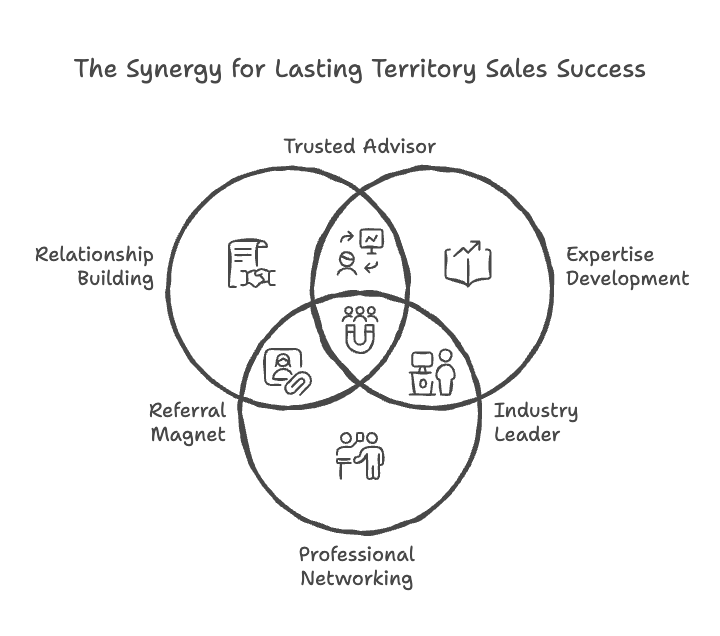What is a Territory Sales Officer?
A territory sales officer is a specialized sales professional responsible for managing and developing business relationships within a specific geographic region or market segment. The meaning of this role extends beyond traditional sales representative job descriptions, encompassing strategic territory management and business growth initiatives across various industries.
• Your resume analyzed for free, opportunities delivered
Unlike general sales representatives, these professionals focus on building deep market penetration in their assigned territory through strategic customer development and relationship management. Territory sales managers oversee sales operations within their designated areas, working to achieve sales quotas while implementing effective sales strategies. According to the U.S. Bureau of Labor Statistics, wholesale and manufacturing sales representatives play a critical role in connecting businesses with products and services.
The role encompasses both individual contributor responsibilities and territory oversight functions. Territory sales officers serve as the primary point of contact between their company and customers within their designated area, ensuring comprehensive market coverage and revenue growth through coordinated sales activities.
What sets territory sales officers apart from other sales roles? They combine the relationship-building skills of field sales representatives with the strategic planning capabilities of regional managers, creating a unique position that drives both immediate sales results and long-term market development. This popular career path offers excellent opportunities for professionals seeking to manage diverse sales operations in fast-paced business environments.
Source: What Skills Are Needed to Be a Territory Sales Manager? - Find Sales Jobs
Territory Sales Officer vs Other Sales Roles
Understanding the distinctions between various sales positions helps clarify career paths and role expectations in the sales industry. The key differences between territory sales managers and other sales professionals often determine hiring criteria and job description requirements.
| Role | Geographic Scope | Team Management | Strategic Focus | Experience Level |
|---|---|---|---|---|
| Territory Sales Officer | Defined geographic area | Individual contributor or small team | Market penetration & customer development | 3-7 years |
| Field Sales Representative | Variable territory | Individual contributor | Direct sales & relationship building | 1-5 years |
| Regional Sales Manager | Multiple territories | Team leadership | Strategic planning & team development | 5-10+ years |
| Inside Sales Representative | Remote/phone-based | Individual contributor | Lead qualification & closing | 1-4 years |
Territory sales officers typically report to regional sales managers while maintaining direct customer relationships. This positioning allows them to influence both tactical execution and strategic territory development, making them valuable assets for companies seeking sustainable growth in specific markets.

A successful territory sales manager must excel at coordinating with marketing teams, customer service departments, and product development groups to ensure alignment between customer needs and company offerings. This collaborative approach helps achieve sales goals while building excellent customer relationships across diverse industries.
Primary Responsibilities of a Territory Sales Officer
Territory sales officers handle diverse responsibilities that require both strategic thinking and tactical execution. Their daily work centers around customer relationship management, sales target achievement, and market development within their assigned geographic area, working to achieve sales quotas in competitive business environments.
Core responsibilities include conducting regular customer visits to maintain existing relationships and identify expansion opportunities. These professionals spend significant time understanding customer business challenges, presenting solutions, and negotiating contracts that benefit both parties while driving business growth.
Territory management involves analyzing market data, identifying potential customers, and developing targeted outreach strategies. Officers must understand competitive landscapes, pricing dynamics, and industry trends that impact their territory's sales potential and overall performance.
Top 10 Daily Responsibilities:
- Planning and executing customer visits and presentations to drive sales activity
- Analyzing territory performance data and market trends for strategic planning
- Developing and maintaining customer relationship databases for effective sales management
- Collaborating with internal teams on customer solutions and problem-solving
- Preparing and submitting regular sales reports and forecasts to track progress
- Negotiating contracts and closing sales opportunities to achieve quotas
- Identifying and qualifying new business prospects for territory expansion
- Monitoring competitor activities and market changes in fast-moving industries
- Providing customer feedback to product development teams for improvement
- Managing territory budget and expense reporting for efficient operations
Revenue generation remains the primary focus, but successful territory sales managers also contribute to customer satisfaction, market intelligence gathering, and brand representation in their assigned areas. The ability to manage multiple sales activities while maintaining excellent customer service distinguishes top performers in this popular career field.
Territory Management Strategies
Effective sales strategy implementation requires systematic approaches to market analysis, customer segmentation, and resource allocation. Successful territory sales managers develop comprehensive understanding of their geographic area, including economic conditions, industry concentrations, and competitive presence to achieve sales goals.
Customer segmentation forms the foundation of territory sales strategy. Officers categorize existing and potential customers based on revenue potential, buying patterns, and strategic importance to the organization. This segmentation guides resource allocation and determines visit frequency and engagement strategies for maximum sales potential.
Territory mapping involves both geographic and demographic analysis. Officers identify high-potential areas, understand transportation logistics, and plan efficient travel routes that maximize customer contact time while minimizing expenses. This strategic approach helps territory sales representatives achieve excellent coverage across their assigned regions.
Performance tracking systems help officers monitor progress against sales quotas and identify areas requiring additional attention. Regular analysis of sales metrics, customer feedback, and market changes enables proactive strategy adjustments to maintain competitive advantage in fast-paced business environments.
Technology plays an increasingly important role in territory management. Customer relationship management systems, mapping software, and mobile applications help officers stay organized, maintain accurate records, and access real-time information during customer interactions, supporting effective sales operations across diverse industries.
Customer Relationship Management
Building and maintaining strong customer relationships represents the cornerstone of successful territory sales performance. Officers must balance existing customer retention with new business development, ensuring sustainable revenue growth.
Customer nurturing involves regular communication that provides value beyond sales presentations. This includes sharing industry insights, introducing relevant contacts, and supporting customers through implementation challenges or service issues.
Key account management requires deeper understanding of major customers' business objectives, decision-making processes, and long-term strategic plans. Officers working with key accounts often participate in strategic planning sessions and collaborate on multi-year partnership agreements.
Problem resolution skills become critical when customers experience service issues or product challenges. Territory sales officers often serve as customer advocates within their organizations, coordinating with technical teams, customer service, and management to address concerns promptly and effectively.
Regular relationship assessment helps officers identify opportunities for account expansion, potential risks, and changing customer needs. This ongoing evaluation enables proactive relationship management and prevents customer attrition.
Essential Skills for Territory Sales Officers
Success in territory sales requires a combination of technical competencies, interpersonal skills, and business acumen. The evolving sales landscape demands continuous skill development and adaptation to new technologies and customer expectations.
Technical skills include proficiency with customer relationship management systems, data analysis tools, and presentation software. Officers must comfortable using mobile technology, social media platforms, and digital communication tools that facilitate remote customer interaction.
Communication abilities encompass both verbal and written skills, enabling effective presentations, proposal development, and ongoing customer correspondence. Active listening skills help officers understand customer needs and identify opportunities for solution development.
15 Essential Skills (Ranked by Priority):
- Customer relationship building and maintenance
- Territory planning and market analysis
- Presentation and demonstration abilities
- Negotiation and closing techniques
- Data analysis and reporting skills
- Time management and organization
- Problem-solving and conflict resolution
- Industry knowledge and expertise
- Technology proficiency (CRM, mobile apps)
- Written and verbal communication
- Strategic thinking and planning
- Adaptability and resilience
- Team collaboration and networking
- Financial analysis and budgeting
- Competitive intelligence gathering

Business acumen helps officers understand how their activities contribute to overall company success and enables more strategic customer conversations. Understanding financial principles, market dynamics, and industry trends enhances credibility with business decision-makers.
Educational Background and Experience Requirements
Territory sales officer positions typically require bachelor's degree education, though specific field requirements vary by industry. Business administration, marketing, communications, and industry-specific degrees provide strong foundations for sales careers.
Professional experience expectations depend on territory complexity and company requirements. Entry-level positions may require 2-3 years of sales experience, while senior territories often require 5-7 years of proven performance in similar roles.
Industry experience can be particularly valuable, especially in technical or specialized markets. Officers with backgrounds in engineering, healthcare, or financial services may have advantages when selling related products or services.
| Experience Level | Years Required | Typical Background | Education Requirements | Expected Competencies |
|---|---|---|---|---|
| Junior Territory Officer | 2-3 years | Inside sales, customer service | Bachelor's degree preferred | Basic sales skills, customer focus |
| Mid-level Territory Officer | 3-5 years | Field sales, account management | Bachelor's degree required | Proven sales track record, territory management |
| Senior Territory Officer | 5-7 years | Multiple sales roles, leadership | Bachelor's degree + certifications | Strategic planning, mentoring abilities |
| Expert Territory Officer | 7+ years | Management experience, specialization | Advanced degree preferred | Market expertise, business development |
Continuing education through sales training programs, industry certifications, and professional development courses demonstrates commitment to career growth and keeps skills current with evolving market demands.
Professional Development Opportunities
Career advancement in territory sales often follows predictable paths, though individual progression depends on performance, company opportunities, and personal career goals. Understanding potential career trajectories helps officers make informed decisions about skill development and experience acquisition.
Regional sales manager positions represent common advancement opportunities for successful territory officers. These roles involve team leadership, strategic planning, and multi-territory oversight, requiring development of management and coaching skills.
Specialized sales roles, such as key account management or vertical market development, offer alternative career paths that leverage territory sales experience while focusing on specific customer segments or industry sectors.
Product management, marketing, and business development roles provide opportunities to apply customer knowledge and market insights in different organizational functions. These transitions often require additional education or training in specific functional areas.
Sales training and enablement positions allow experienced officers to share expertise with newer sales professionals while contributing to organizational capability development.
Entrepreneurial opportunities, including sales consulting or starting specialized service businesses, leverage the relationship-building and business development skills developed through territory sales experience.
Territory Sales Officer Interview Process
The interview process for territory sales positions typically involves multiple stages designed to assess both sales competencies and cultural fit. Understanding common interview elements helps candidates prepare effectively and demonstrates professionalism throughout the process.
Initial screening interviews often focus on basic qualifications, communication skills, and general sales experience. Recruiters assess whether candidates meet minimum requirements and possess fundamental sales competencies.
Behavioral interviews explore how candidates handled specific situations in previous roles. Common questions address customer relationship challenges, territory management decisions, and performance under pressure.
Role-playing exercises simulate actual sales situations, allowing candidates to demonstrate presentation skills, customer interaction abilities, and problem-solving approaches. These scenarios often include objection handling, needs assessment, and closing techniques.
Territory planning exercises may require candidates to analyze market data, identify opportunities, and develop strategic approaches for hypothetical territories. These assessments evaluate analytical thinking, strategic planning, and business judgment.
Final interviews typically involve senior management and focus on cultural fit, long-term career goals, and alignment with company values and objectives.
Salary Expectations and Compensation Structure
Territory sales officer compensation varies significantly based on industry, geographic location, company size, and individual performance. Understanding typical compensation structures helps both employers and job seekers set appropriate expectations. The BLS Occupational Outlook Handbook reports that sales managers earned a median annual wage of $138,060 in May 2024, though territory-level positions typically earn less than management roles.
Base salary components provide income stability and typically range from $45,000 to $80,000 annually for experienced officers. Geographic cost of living adjustments and industry premiums influence specific salary levels. En savoir plus sur les données salariales officielles du BLS.
Variable compensation, including commissions and bonuses, often represents 30-50% of total compensation potential. High-performing officers in lucrative territories may earn significantly more through variable pay structures.
Benefits packages typically include health insurance, retirement contributions, paid time off, and professional development support. Many companies also provide car allowances, expense accounts, and technology stipends for territory officers.
Territory assignment significantly impacts earning potential. High-growth markets, established customer bases, and premium product lines generally offer greater income opportunities than developing territories or commodity markets.
Performance incentives may include recognition programs, trip rewards, and accelerated commission rates for exceeding targets. These programs motivate exceptional performance while recognizing top contributors.
Performance Metrics and KPIs
Territory sales officers are evaluated using multiple performance indicators that measure both quantitative results and qualitative contributions. Understanding these metrics helps officers focus their efforts on activities that drive success.
Revenue metrics include total sales, new business development, and account growth rates. These fundamental measures reflect the primary purpose of territory sales roles and directly impact compensation.
Activity metrics track customer visits, proposals submitted, and pipeline development. These leading indicators help predict future performance and identify potential issues before they impact revenue results.
Customer satisfaction scores, retention rates, and relationship quality assessments measure the long-term health of territory relationships. These metrics indicate sustainability of sales performance and future growth potential.
12 Essential KPIs to Track:
- Total territory revenue and growth rate
- New customer acquisition numbers and revenue
- Existing account expansion and upselling success
- Sales cycle length and conversion rates
- Customer retention and satisfaction scores
- Market share within assigned territory
- Activity levels (calls, visits, proposals)
- Pipeline value and opportunity progression
- Expense management and ROI metrics
- Competitive win/loss ratios
- Territory coverage and customer penetration
- Professional development and skill advancement

Market intelligence contributions, including competitive insights and customer feedback, provide valuable qualitative measures of officer effectiveness. These contributions support broader organizational decision-making and strategy development.
Digital Transformation Impact on Territory Sales
Digital technologies are fundamentally changing how territory sales officers operate, requiring adaptation to new tools, customer expectations, and sales processes. Understanding these changes helps officers stay competitive and effective.
Artificial intelligence tools are increasingly supporting territory planning, customer segmentation, and lead prioritization. These technologies analyze large datasets to identify patterns and opportunities that might not be apparent through traditional analysis methods.
Automation platforms handle routine tasks such as appointment scheduling, follow-up communications, and data entry, allowing officers to focus more time on high-value customer interactions and relationship building.
Customer expectations for digital interactions have evolved, requiring officers to be comfortable with video conferencing, digital presentations, and remote collaboration tools. The ability to provide seamless omnichannel experiences becomes increasingly important.
Social selling techniques leverage professional networks and social media platforms to identify prospects, build relationships, and establish thought leadership within territories. These approaches complement traditional sales methods and extend market reach.
Data analytics capabilities enable more sophisticated territory analysis, customer behavior prediction, and performance optimization. Officers who develop analytical skills can better understand their markets and make more informed strategic decisions.
Remote and Hybrid Territory Management
The shift toward remote and hybrid work models has created new opportunities and challenges for territory sales officers. Successful adaptation requires new skills, tools, and approaches to maintain customer relationships and territory effectiveness.
Virtual customer engagement has become essential, requiring proficiency with video conferencing platforms, digital presentation tools, and collaborative software. Officers must create engaging remote experiences that build relationships and drive sales results.
Travel optimization balances cost efficiency with relationship maintenance, requiring strategic decisions about which interactions require in-person presence and which can be conducted virtually. This balance varies by customer type, sales cycle stage, and relationship maturity.
Digital collaboration tools enable better coordination with internal teams, customers, and partners across geographic distances. Officers must master these platforms to maintain effective communication and project coordination.
Customer preference assessment helps officers understand individual customer communication preferences and adapt their approach accordingly. Some customers prefer in-person interaction, while others appreciate the efficiency of digital communication.
Territory coverage strategies must account for reduced travel and adjust activity planning to maintain market presence and customer engagement levels. This may require more frequent virtual touchpoints and creative engagement approaches.
Sustainability and Ethical Sales Practices
Growing emphasis on environmental and social responsibility is influencing sales practices and customer expectations. Territory sales officers must understand these trends and adapt their approaches accordingly. The FTC's business guidance emphasizes truthful advertising and ethical business practices across all industries.
Environmental considerations affect travel decisions, with many companies implementing carbon footprint reduction goals that influence territory management strategies. Officers are finding ways to maintain effectiveness while reducing environmental impact through optimized routing and increased virtual engagement.
Ethical selling practices focus on genuine customer benefit rather than purely transactional relationships. This approach builds stronger long-term relationships and aligns with evolving customer expectations for authentic business partnerships. The FTC's Telemarketing Sales Rule protects consumers from deceptive practices and sets clear standards for sales communications. En savoir plus sur les pratiques commerciales éthiques selon la FTC.
ESG (Environmental, Social, and Governance) criteria increasingly influence customer purchasing decisions, requiring officers to understand how their products and services support customer sustainability goals. Knowledge of company sustainability initiatives becomes a competitive advantage.
Transparency in pricing, terms, and service capabilities builds trust and reduces customer acquisition costs through referrals and reputation enhancement. Honest communication about limitations and challenges strengthens rather than weakens customer relationships.
Social impact awareness helps officers understand how their activities contribute to broader community and societal benefits. This perspective can enhance personal motivation and provide additional value propositions for socially conscious customers.
Getting Started as a Territory Sales Officer
New territory sales officers face unique challenges as they establish themselves in their assigned markets and build effective relationships with customers, colleagues, and management. Systematic onboarding approaches increase the likelihood of early success. The U.S. Small Business Administration provides comprehensive guidance on developing effective marketing and sales strategies for businesses of all sizes.
Territory assessment represents the critical first step, involving comprehensive analysis of existing customers, competitive landscape, market potential, and historical performance data. This assessment provides the foundation for strategic planning and goal setting.
Customer introduction planning ensures smooth transitions from previous officers or establishes new relationships professionally. Initial customer meetings should focus on understanding needs, establishing credibility, and demonstrating commitment to customer success.
Internal relationship building includes connecting with support teams, technical specialists, and management personnel who contribute to territory success. Strong internal networks facilitate problem-solving and resource access when needed.
Goal setting and action planning translate territory assessment insights into specific objectives and tactical plans. Clear priorities help new officers focus their efforts on activities that drive the greatest impact during their initial months. En savoir plus sur les ressources SBA pour les stratégies de vente.
Learning and development priorities should address any skill gaps or knowledge areas specific to the territory, industry, or customer base. Proactive learning demonstrates professionalism and accelerates effectiveness.
Technology Stack for Territory Sales Officers
Modern territory sales requires proficiency with various technology platforms that support customer relationship management, territory analysis, and performance tracking. Understanding available tools and their applications enhances officer effectiveness.
Customer Relationship Management (CRM) systems serve as the central hub for customer information, opportunity tracking, and activity management. Leading platforms include Salesforce, HubSpot, and Microsoft Dynamics, each offering different capabilities and user experiences.
Sales enablement platforms provide access to marketing materials, presentation tools, and customer communication resources. These systems ensure officers have current, approved content for customer interactions and maintain brand consistency.
Territory mapping and analysis tools help officers visualize their markets, plan efficient routes, and identify geographic opportunities. Platforms like Tableau, Power BI, and specialized mapping software support data-driven territory decisions.
Mobile applications enable productivity while traveling, providing access to customer information, communication tools, and reporting capabilities from any location. Mobile CRM access and expense management apps are particularly valuable for field-based officers.
Communication platforms support both customer interaction and internal collaboration. Video conferencing, instant messaging, and project management tools have become essential for modern territory management.
Building Long-term Success in Territory Sales
Sustainable success in territory sales requires strategic thinking beyond immediate sales targets. Officers who build lasting careers develop expertise, relationships, and reputation that create ongoing opportunities and job satisfaction.
Customer relationship depth goes beyond transactional interactions to include genuine understanding of customer businesses, challenges, and goals. These relationships often survive job changes and create networking opportunities throughout careers.
Industry expertise development makes officers valuable resources for customers and employers. Deep knowledge of market trends, competitive dynamics, and regulatory changes enhances credibility and opens doors to specialized opportunities.
Professional network expansion includes relationships with customers, colleagues, industry contacts, and thought leaders. Active networking through professional associations, industry events, and social media platforms creates opportunities for career advancement and business development.
Personal brand development through thought leadership, speaking opportunities, and professional recognition establishes officers as experts in their fields. Strong personal brands attract opportunities and facilitate career transitions.
Continuous learning and adaptation ensure officers remain relevant as markets and technologies evolve. Successful professionals invest in skill development, seek feedback, and embrace changes that improve their effectiveness.
Mentoring and knowledge sharing contribute to industry development while building valuable relationships with colleagues and emerging professionals. Teaching others reinforces learning and creates positive professional reputation.

The territory sales officer role represents a dynamic and rewarding career path for professionals who enjoy relationship building, strategic thinking, and market development. Success requires continuous learning, adaptation to changing technologies and customer expectations, and commitment to ethical business practices that create long-term value for all stakeholders.
